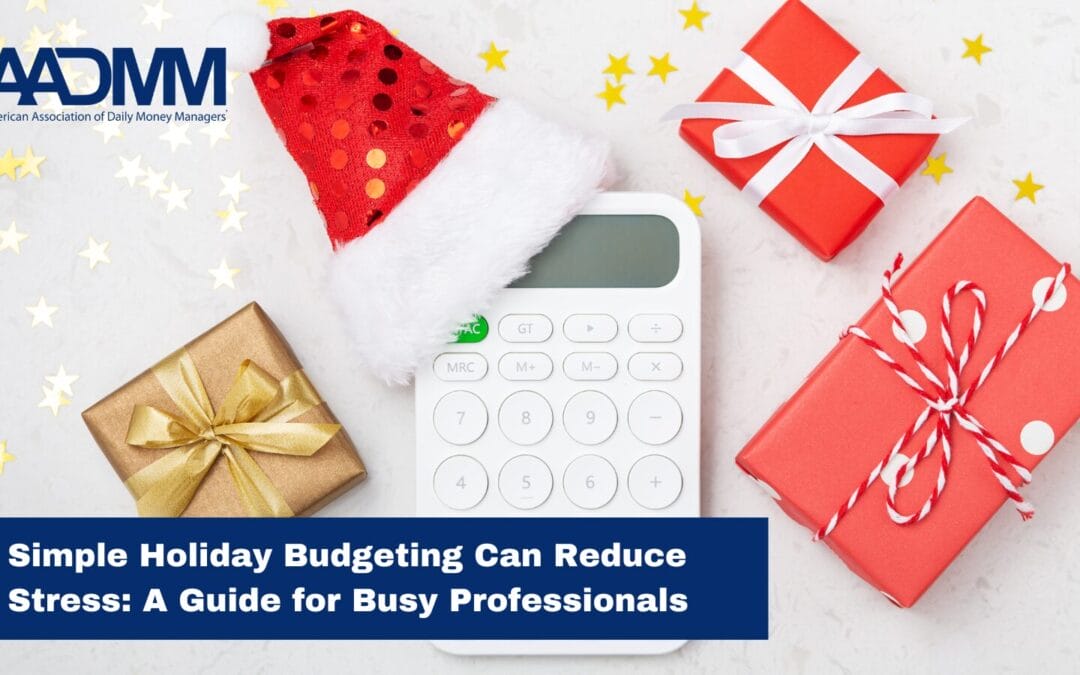As the holiday season approaches, many of us feel a mix of excitement and anxiety. Amid the festive atmosphere, gift-giving, holiday gatherings, and travel costs can quickly add up, often leaving us with an inflated credit card bill come January. For busy professionals, balancing a packed work schedule with holiday planning makes it all too easy to overspend. However, with a few straightforward tactics, you can plan your holiday budget effectively and enjoy the season without financial stress.
- Set a realistic holiday budget
The first step to staying in control of your holiday spending is to set a realistic budget. Begin by identifying all potential expenses. Common categories include:
- Gifts (for family, friends, colleagues)
- Travel (flights, gas, accommodations)
- Entertaining and dining (hosting holiday meals, dining out)
- Decorations (holiday décor, tree, lighting)
- Charitable giving (donations, gift drives)
Once you have your categories, determine how much you can afford to spend in total. A good rule of thumb is to allocate a portion of your overall budget—typically no more than 1.5% of your annual income—to holiday-related expenses. Use this amount to distribute funds across your categories.
- Automate your holiday savings
If you haven’t started saving for the holidays, it’s not too late. Set up an automatic transfer into a separate “holiday fund” account each week leading up to the season. Even small contributions add up over time. Automating this process allows you to save effortlessly without having to think about it.
For those who prefer using credit cards to maximize rewards, consider using a cash-back card specifically for holiday purchases. However, be cautious to avoid overspending just for the sake of earning points. Pay off your balances in full at the end of each month to avoid accumulating debt.
- Shop smart: Avoid impulse purchases
Impulse buying is one of the biggest culprits of holiday overspending. To avoid this, create a gift list in advance. Write down everyone you plan to buy for and assign a budget to each person. Stick to your list when shopping, whether online or in-store.
If possible, take advantage of holiday sales—Black Friday, Cyber Monday, and pre-holiday promotions can offer significant savings. However, stay focused on your gift list to avoid purchasing unnecessary items just because they’re on sale.
Consider price comparison apps and browser extensions that alert you when prices drop on items you’re watching. These tools can help ensure you’re getting the best deal.
- Prioritize experiences over expensive gifts
Rather than focusing on costly presents, consider offering experiences or more meaningful gifts. Busy professionals often value quality time with loved ones more than material items. Organize a group activity, such as a holiday outing or dinner, or give thoughtful, personalized gifts that don’t break the bank.
For example, creating a custom photo album or gifting a subscription to a favorite service (like streaming or a meal kit) can be thoughtful without being extravagant. Additionally, homemade gifts can be a great alternative to expensive store-bought options.
- Manage holiday travel costs in advance
If travel is part of your holiday plan, book your flights, accommodations, and car rentals as early as possible to avoid last-minute price hikes. Use tools like Google Flights, Hopper, or Skyscanner to track prices and find the best deals. Setting up price alerts can also help you lock in the lowest fares.
If your work schedule allows for flexibility, consider traveling on off-peak days, which tend to be less expensive. Additionally, be mindful of hidden travel costs, such as baggage fees or airport parking, which can add up quickly.
- Prepare for unexpected expenses
No matter how carefully you plan, unexpected expenses tend to crop up during the holiday season. Whether it’s an extra gift for someone who wasn’t on your list, a higher-than-expected dinner bill, or last-minute travel changes, it’s wise to build a small buffer into your holiday budget. Aim to set aside 5-10% of your holiday budget for these unplanned costs.
- Reflect and adjust for next year
Once the holiday season ends, take some time to reflect on your spending. Did you stick to your budget? Were there any areas where you overspent? Keep a record of your expenses to use as a reference when planning for the next holiday season. This practice will help you refine your budget year after year, making each holiday season more financially manageable.
By implementing these strategies, busy professionals can enjoy the holiday season without the stress of financial strain. With a clear budget, smart shopping habits, and a focus on meaningful experiences, you’ll set yourself up for a successful and joyous celebration.
Jeremy Zizmor is a Daily Money Manager and founder of Assurance Family Partners LLC, in Boston.











